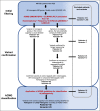Genetic Sequencing of Pediatric Patients Identifies Mutations in Monogenic Inflammatory Bowel Disease Genes that Translate to Distinct Clinical Phenotypes
- PMID: 32463623
- PMCID: PMC7145023
- DOI: 10.14309/ctg.0000000000000129
Genetic Sequencing of Pediatric Patients Identifies Mutations in Monogenic Inflammatory Bowel Disease Genes that Translate to Distinct Clinical Phenotypes
Abstract
Objectives: Monogenic inflammatory bowel disease (IBD) comprises rare Mendelian causes of gut inflammation, often presenting in infants with severe and atypical disease. This study aimed to identify clinically relevant variants within 68 monogenic IBD genes in an unselected pediatric IBD cohort.
Methods: Whole exome sequencing was performed on patients with pediatric-onset disease. Variants fulfilling the American College of Medical Genetics criteria as "pathogenic" or "likely pathogenic" were assessed against phenotype at diagnosis and follow-up. Individual patient variants were assessed and processed to generate a per-gene, per-individual, deleteriousness score.
Results: Four hundred one patients were included, and the median age of disease-onset was 11.92 years. In total, 11.5% of patients harbored a monogenic variant. TRIM22-related disease was implicated in 5 patients. A pathogenic mutation in the Wiskott-Aldrich syndrome (WAS) gene was confirmed in 2 male children with severe pancolonic inflammation and primary sclerosing cholangitis. In total, 7.3% of patients with Crohn's disease had apparent autosomal recessive, monogenic NOD2-related disease. Compared with non-NOD2 Crohn's disease, these patients had a marked stricturing phenotype (odds ratio 11.52, significant after correction for disease location) and had undergone significantly more intestinal resections (odds ratio 10.75). Variants in ADA, FERMT1, and LRBA did not meet the criteria for monogenic disease in any patients; however, case-control analysis of mutation burden significantly implicated these genes in disease etiology.
Discussion: Routine whole exome sequencing in pediatric patients with IBD results in a precise molecular diagnosis for a subset of patients with IBD, providing the opportunity to personalize therapy. NOD2 status informs risk of stricturing disease requiring surgery, allowing clinicians to direct prognosis and intervention.
Figures

References
-
- Hugot JP, Laurent-Puig P, Gower-Rousseau C, et al. Mapping of a susceptibility locus for Crohn's disease on chromosome 16. Nature 1996;379:821–3. - PubMed
-
- Hugot JP, Chamaillard M, Zouali H, et al. Association of NOD2 leucine-rich repeat variants with susceptibility to Crohn's disease. Nature 2001;411:599–603. - PubMed
Publication types
MeSH terms
Substances
LinkOut - more resources
Full Text Sources
Medical
Research Materials

